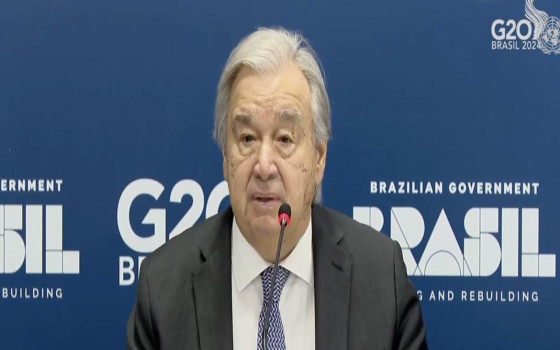
UN Secretary-General urges G20 to exert leadership efforts to promote peace and climate action.. Addressing the situations in Gaza, Lebanon, Sudan and Ukraine

- Europe and Arabs
- Monday , 18 November 2024 12:50 PM GMT
Rio de Janeiro: Europe and the Arabs
The UN Secretary-General urged G20 leaders to use their economic and diplomatic influence to promote peace, climate action and finance development efforts in vulnerable countries, stressing the need to accelerate efforts to address common challenges.
G20 members represent about 85% of global GDP, more than 75% of world trade and about two-thirds of the world's population. According to the UN's daily news bulletin
At a press conference in Brazil ahead of the G20 summit, Secretary-General António Guterres spoke about the most prominent challenges of what he described as "turbulent times", saying: "I have arrived from the 29th Climate Conference in Baku, Azerbaijan. From Baku to Brazil and beyond, I see and hear common issues and concerns. Our times are turbulent, and we need to race faster to address common core challenges."
The Secretary-General spoke about the climate crisis and record-breaking weather conditions, while conflicts rage and impunity is rampant in repeated violations of international law and the UN Charter. Inequality is growing while progress towards eradicating poverty and hunger is stalled, he said.
António Guterres also noted that the Sustainable Development Goals are not on track to be achieved, and said that new technologies have unprecedented potential to do both good and evil. “Our inability to address these challenges is undermining people’s trust in governments and institutions,” he added.
The Secretary-General stressed that the threats facing the world today are interconnected and global, but the international institutions responsible for solving problems urgently need updating, Guterres said, referring in particular to the UN Security Council, which he said “reflects the world of 80 years ago.”
The Secretary-General noted that UN member states adopted a Charter for the Future in September to help strengthen multilateralism and advance the Sustainable Development Goals. He said he came to Rio, Brazil, with a simple message: G20 leaders must lead the way and use their economic and diplomatic clout to address global problems. Peace, finance and climate
The Secretary-General focused on three key areas where the group needs to work:
First, peace, saying that people are paying a terrible price for wars and stressing the need to step up peace efforts. He added:
“Peace in Gaza – with an immediate ceasefire, the immediate release of all hostages and the beginning of an irreversible process towards a two-state solution.
Peace in Lebanon – with a ceasefire and meaningful steps towards the full implementation of Security Council resolutions.
Peace in Ukraine – following the UN Charter, UN resolutions and international law.
Peace in Sudan – with leaders pressuring the warring parties to end the horrific violence and humanitarian crisis facing civilians.”
Guterres said peace everywhere requires action based on the values of the UN Charter, the rule of law and the principles of sovereignty, political independence and territorial integrity of states.
The second area the Secretary-General focused on was finance, saying that vulnerable states face enormous obstacles not of their own making and are not getting the level of support they need from the “unjust, ineffective and outdated” global financial architecture.
He added that the Charter for the Future calls for ambitious reforms to make this system more representative of the international economy and the needs of developing and vulnerable countries.
The Secretary-General moved on to talk about the third area, climate, and expressed his concern about the pace of negotiations at the Climate Conference held in Baku (COP-29). He stressed the need for countries to agree on an ambitious climate finance target that rises to the scale of the challenge facing developing countries.
He said that having an ambitious and credible target is essential to build trust between developing and developed countries and stimulate the preparation of ambitious national plans next year. He added that “finance fuels ambition.” He said that it is time for the largest economies and greenhouse gas emitters to lead by example.
For the Secretary-General, “failure is not an option.” He pointed out that current climate policies by countries are pushing the world towards a catastrophic temperature rise of 3.1 degrees Celsius by the end of this century. “To avoid the worst climate catastrophe in the future, we must limit temperature rise to 1.5 degrees Celsius, so emissions must be reduced by 9% per year until 2030, but emissions are still rising,” he said.
He noted that the G20 countries are responsible for 80% of the world’s greenhouse gases, and stressed the need for these countries to lead with national climate plans that follow the guidelines they agreed last year.
As Brazil prepares to host the UN Climate Conference (COP-30) next year, the Secretary-General said he is working closely with the Brazilian President on international mobilization efforts to secure the highest levels of ambition from all countries, especially the G20.
He also stressed the importance of combating the “coordinated disinformation campaigns” that are hindering global progress on climate change, from climate denial to “greenwashing” and harassment of climate scientists.
While the world faces many challenges, there are also many solutions, the Secretary-General said. He stressed the need to seize all opportunities to lead transformative action towards a safer, more secure and more sustainable world. The G20 consists of 19 countries (Argentina, Australia, Brazil, Canada, China, France, Germany, India, Indonesia, Italy, Japan, Republic of Korea, Mexico, Saudi Arabia, South Africa, Russia, Turkey, United Kingdom and the United States) and two regional bodies: the African Union and the European Union.












No Comments Found